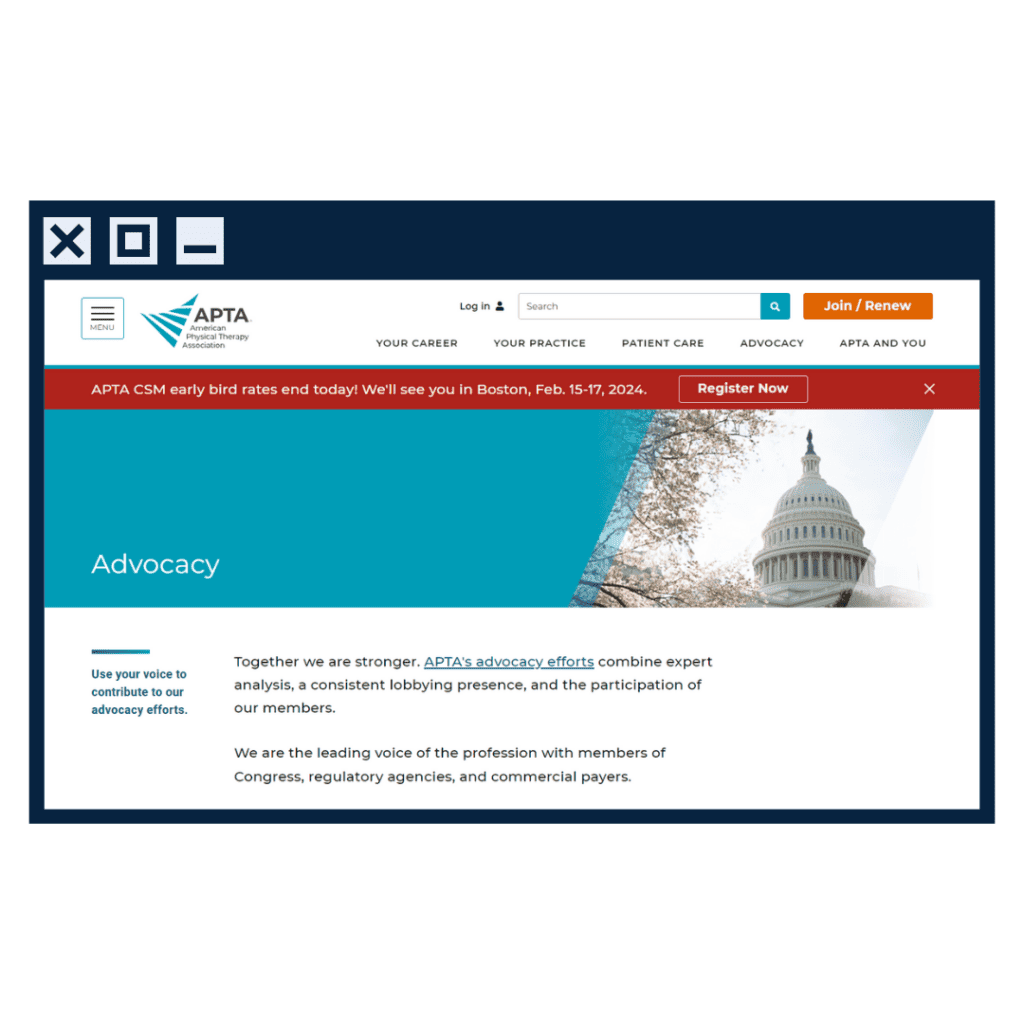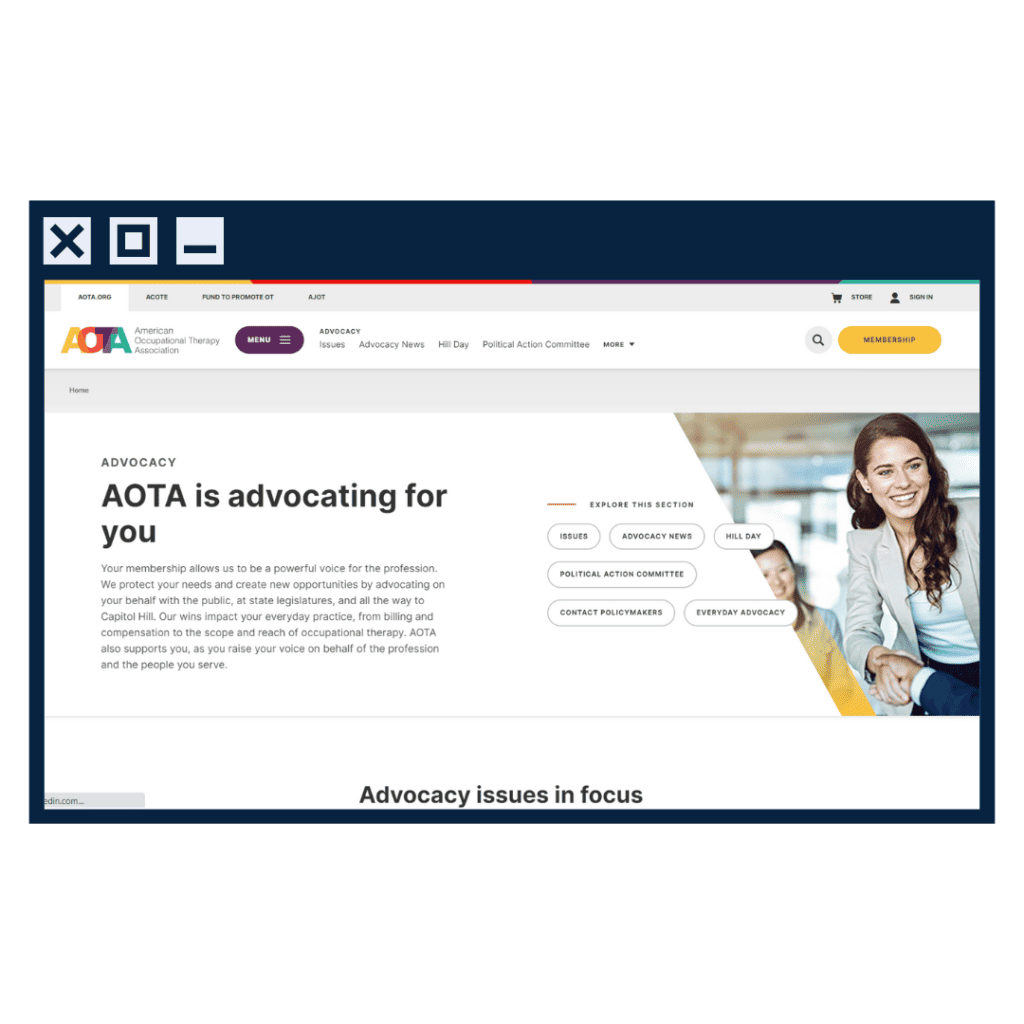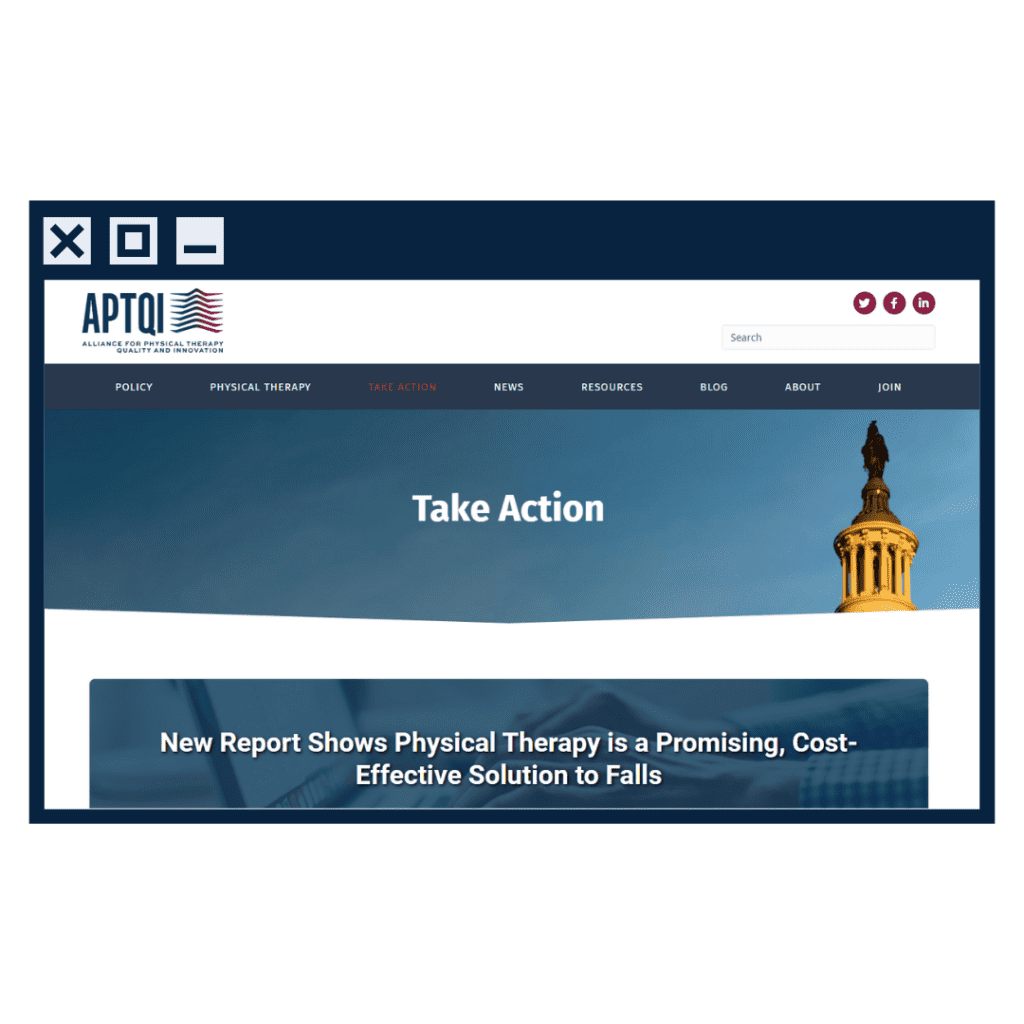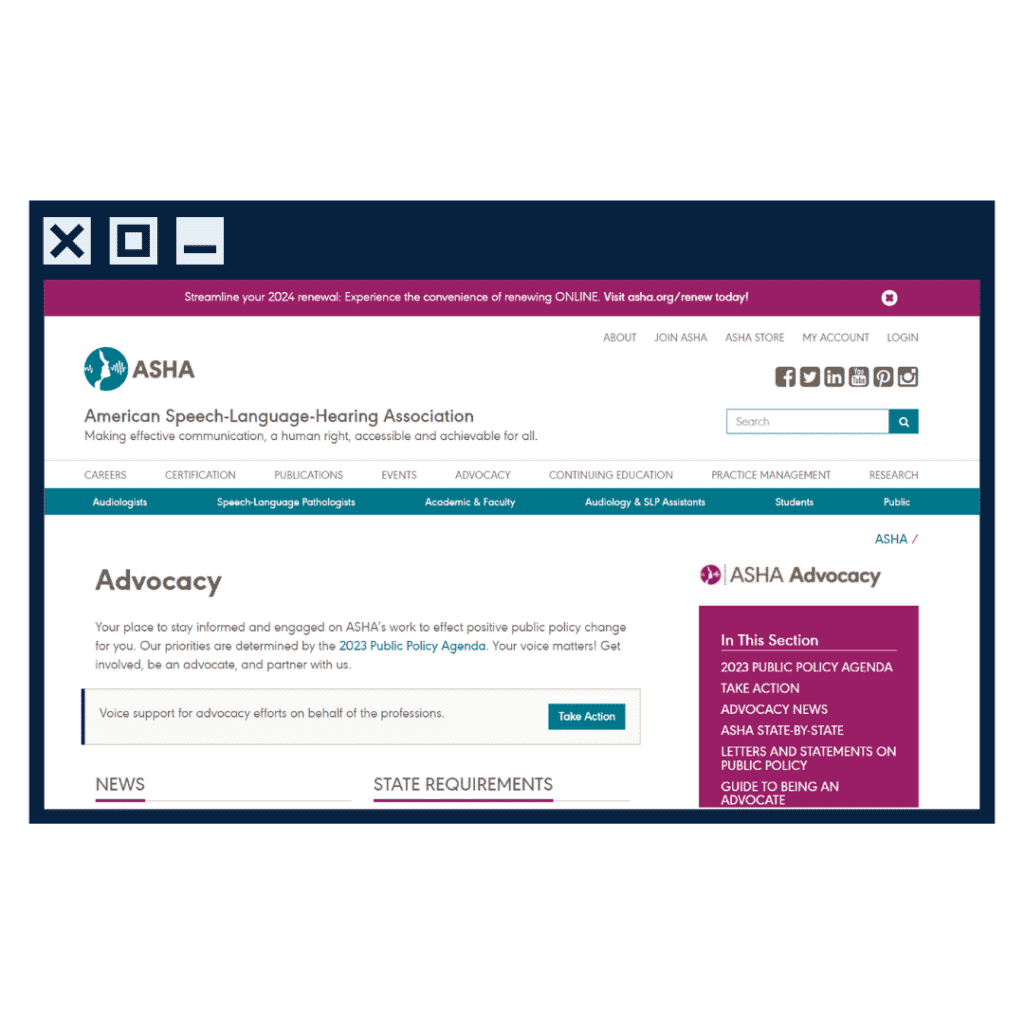As we usher in the new year, the playing field for rehabilitation and physical therapy advocacy is made up of both new and familiar challenges.
From managing declining reimbursements, to finding a home for AI in clinical practice, to battling industry-wide burnout… There’s a lot to cover, but we’ll size up those hurdles shortly.
The good news—and most important takeaway—is that rehab therapy professionals have the power to influence the future of the field. Professional organizations for PT, OT, and SLP are taking the lead, but there’s room for every individual to contribute.
So let this article be more than a forecast; use it as your game plan for action in 2024!
Challenges in Rehabilitation and Physical Therapy Advocacy
You can’t make a change in the rehab and physical therapy field without understanding its most significant challenges. Here are a few of the barriers rehab therapists and practice owners will need to address in the coming year.
Declining Reimbursements
Profit margins can be slim in outpatient therapy, so tackling decreasing reimbursement rates is a top priority for advocacy efforts.
Advocacy organizations have pushed back on the lack of control over third-party reimbursement rates and annual declines in the Medicare conversion factor, including a finalized 3.4% cut in 2024. Organizations like the APTQI have released comment letters urging Congress to prevent the cut before it goes into effect on January 1, 2024.
For therapy assistants, the impact has been even more pronounced, with a 15% payment cut for Medicare Part B services that was introduced in 2022.
Action Items
- Urge Congress to end the Final Rule’s -3.4% adjustment to the 2024 conversion factor via the APTQI Action Center.
- Listen to APTA CEO, Justin Moore, on “The Biggest Issues Facing Physical Therapy Practices Today.”
- Listen to RCM expert, Tricia Morgan-Putt, on “Surviving Medicare Cuts.”
- Stay informed about updates to the 2024 Medicare Physician Fee Schedule.
Staffing Challenges and Burnout
The high churn rate among rehabilitation staff is an undeniable cause for concern.
With as many as 80% of therapists experiencing symptoms of burnout, we need to think beyond individual solutions. Self-care is important, but it’s clear that we need profession-wide improvements to support the health of patients and providers.
What could that look like, in reality? Some suggest adapting to the demand for more flexible schedules, addressing root causes of burnout, or finding ways to alleviate stressors, like the burden of student debt.
Action Items
- Read about “The High Cost of Burnout in Physical Therapy Practices.”
- Listen to Senior VP of the APTA, Tara Manal, on “Addressing the Biggest Therapy & Rehab Workforce Challenges.”
Access to Care for Underserved Populations
Rehabilitation therapy is crucial for rural communities, where access to essential health services is often limited. One in five rural Americans are over the age of 65, which means the importance of rehabilitative care in these areas cannot be overstated.
Recent legislative and advocacy campaigns—including the EMPOWER Act—focus on direct supervision, pushing for occupational and physical therapy assistants to be able to deliver care more autonomously.
Another angle: Making rural positions more appealing to job-seekers. For example, offering free student housing, or supporting opportunities for loan repayment for recent graduates via participation in the National Health Services Corps.
Action Items
- Urge your elected officials to support the EMPOWER Act, which would “reduce the burdensome requirements for direct supervision of occupational therapy assistants in Medicare private practice settings.”
- Learn more and support the PT Student Loan Repayment Bill, which would “allow PTs to participate in a federal program that provides student loan repayment in exchange for work at an approved site in a rural and underserved areas.”
- Listen to First Settlement Physical Therapy CEO, Simon Hargus, on “Tips and Tricks to Running a Successful Therapy Practice in Rural America.”
Emerging Technology and Regulatory Changes
One of the hottest topics in physical therapy we foresee in 2024 is also one of the oldest: adapting to emerging technologies.
Of course, we can’t look back on the last year without acknowledging the massive impact of generative AI—nor can we ignore its risks. Looking ahead, the rehab therapy field will need to define the role and regulation of AI across clinical workflows, practice management, and marketing.
With the rising cost of care delivery, rehab therapy practices will also need to take a closer look at their tech stacks in 2024. For some, that means consolidating multiple third-party tools into streamlined, all-in-one platforms. For others, regulatory changes will define whether or not to make the switch from an EMR to a specialized EHR.
For any clinician, it’s important to stay aware of—and contribute to—advancements in the tools you use every day.
Action Items
- Stay in the loop about AI for rehabilitation therapy.
- Learn how EHRs fit in to healthcare’s movement toward value-based care.
- Participate in industry-wide conversations online, within professional organizations, or industry events like TherapyCon.
Advocacy Campaigns and Resources for Rehab Therapy
Making a change is achievable–and we can prove it! Here are some PT, OT, and SLP professional organizations that offer action guides, share policy statements, and highlight recent wins or regulatory changes.
American Physical Therapy Association (APTA)
The American Physical Therapy Association (APTA) is a professional organization representing physical therapists, physical therapist assistants, and students of physical therapy with the aim of advancing the profession through education, research, and advocacy.

Focus Areas
- Advocating against Medicare payment cuts.
- Advocating to eliminate the burden of direct supervision requirements for PTAs.
- Supporting continued PT and PTA service provision via telehealth.
- Creating opportunities for PTs and PTAs within state and federal incentive and debt relief programs.
- Raising awareness and expanded availability of pelvic therapy services.
- Expanding locum tenens allowances for physical therapy.
American Occupational Therapy Association (AOTA)
The American Occupational Therapy Association (AOTA) is a national professional association established to support occupational therapy practitioners and improve the quality of occupational therapy services.

Focus Areas
- Working to alleviate the impact of Medicare payment cuts for OTAs.
- Supporting the OT Licensure Compact to improve licensure portability and improve continuity of care for patients.
- Advocating against Medicare payment cuts.
- Supporting federal policies to improve diversity within the OT profession.
- Advocating for the expansion of OT telehealth services.
Association of Physical Therapists in Private Practice (APTQI)
The Association of Physical Therapists in Private Practice (APTQI) is a coalition of physical therapy clinic owners advocating for the interests of private practice physical therapy and the clients they serve in the legislative and regulatory arenas.

Focus Areas
- Advocating against Medicare payment cuts.
- Working with the Centers for Medicare and Medicaid Services to reform regulatory requirements.
- Demonstrating improved outcomes in fall injury prevention and recovery.
- Demonstrating the value of PT as an alternative to opioids in treatment of chronic pain.
- Addressing the workforce shortage in the field of physical therapy.
- Reducing the impact of Medicare cuts and direct supervision requirements for PTAs.
American Speech-Language-Hearing Association (ASHA)
The American Speech-Language-Hearing Association (ASHA) is the professional, scientific, and credentialing association for audiologists, speech-language pathologists, and speech, language, and hearing scientists, providing leadership and setting standards for the professions’ integrity, efficacy, and excellence.

Focus Areas
- Advocate for healthcare priorities for audiology and SLP, including increasing access to care, expanding coverage of services, and inclusion in emerging health care delivery systems.
- Support the audiology and SLP workforce with various initiatives, including federal and state funding, representation in the U.S. Department of Education, and more.
- Support the working standards for audiology and SLP, and increase the value and portability of licensure and certification.
- Educate policymakers on the significance of patient needs, including OTC hearing aids, screening services, early intervention, and other treatment.
- Increase the diversity of SLP and hearing science profession with anti-discriminatory policies and inclusive programs, while highlighting the impact of social determinants of health for patients and clients.
How to Make an Impact in 2024
The stage for change is waiting for your debut. There are many pathways to advocacy, depending on your unique story, skills, and interests. Let’s explore your options:
Advocacy Training
Coordinating peer training opportunities can be a good way of giving your fellow practitioners the mic. The advocacy training gives providers the tools to make a difference. This could include conducting training on how to:
- Identify and contact your legislators.
- Develop and deliver an effective message.
- Build relationships with legislators.
- Work with other healthcare professionals to advocate for common goals.
Join Professional Organizations
Options include, but are not limited to, those mentioned above (APTA, AOTA, APTQI, and ASHA). Even if you aren’t a member, you can donate directly to your political action committees (PAC), like the APTA’s PT-PAC.
Promote Patient Education and Participation
Garnering support from the patients goes a long way. You could set up letter-writing stations in your waiting area or create a patient engagement campaign to educate about issues that face the profession.
Advocacy Days
These offer a chance to speak directly with legislators. Area organizations can coordinate this for your specialty, often with virtual or in-person options.
Support a Diverse Workforce
You can champion an inclusive culture at your practice or join an identity-oriented professional organization (like the National Association of Black Physical Therapists), for example.
Talk the Talk
Join the conversation at industry networking and professional events. Hint: Participating in a rehab therapy-focused “What Keeps You Up at Night” roundtable at TherapyCon ’24 is a great place to start!
A Voice for Student Advocates
You don’t have to be a licensed therapist to make a change; some students are already joining the push for improvements in rehab therapy.
Options for rehabilitative therapy students, for example, include joining pre-professional organizations, like the National Student Speech Language Hearing Association (NSSLHA), or participating in events such as APTA’s Student Advocacy Challenge.
For current practice leaders, offering mentorship opportunities to rising professionals can introduce students to current advocacy issues, as well as how to get involved in advocacy when they enter the workforce.
Join the Conversation
Remember the most important takeaway we highlighted at the beginning?
Rehab therapy professionals have the power to influence the future of the field. By collaborating and taking many small steps, together, therapists and practice owners can resist getting bogged down by the biggest challenges.
Keep in mind, there’s no “right” way to become an advocate. Rather, the goal should be to create an industry-wide culture of active participation.
So, how will you start?
Think about one of your professional goals, on an individual or business-wide level. What barriers or challenges stand in your way? And what will be your first step toward making your goal a reality?



